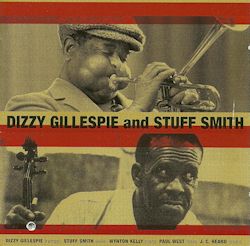1. Rio Pakistan
2. It’s Only a Paper Moon
3. Purple Sounds
4. Russian Lullaby
5. Oh, Lady Be Good
6. Caravan
7. Caravan (alternate take)
8. Nobody Knows the Trouble I’ve Seen
9. The Bluest Blues
10. On the Sunny Side of the Street
11. Stardust
12. Time on My Hands
13. Blue Skies
14. The Umbrella Man
15. Pop’s Confessin’
16. Oo-Shoo-Be-Doo-Be
17. They Can’t Take That Away from Me.
Dizzy Gillespie – Trumpet, vocals
Stuff Smith – Violin (tracks 1-12)
Wynton Kelly - Piano (tracks 1-5, 13-17)
Paul West – Bass (tracks 1-5)
J. C. Heard – Drums (tracks 1-5)
Bill Graham - Baritone sax (tracks 6-17)
Milt Jackson – Piano, vocals (tracks 6-12)
Percy Heath – Bass (tracks 6-12)
Al Jones – Drums (tracks 6-17)
Joe Carroll – Vocals (tracks 8-17)
Bernie Griggs – Bass (tracks 13-17)
Dizzy Gillespie makes the perfect partner for Stuff Smith. They both have a humorous, anarchic approach and they both play in an unconventional manner.
They each have their own favourite clichés, which make frequent appearances in this collection – each liking to play phrases which start high up and swirl
their way down (Smith likes to swirl his way up, as well). But there is no doubt that they are consummate swingers.
The first five tracks of this CD come from the 1957 LP Dizzy Gillespie & Stuff Smith. The next seven tracks are from their first recording
date together – in 1951. And the last five tracks come from a small-group session recorded in 1952 by Dizzy without Stuff Smith.
Stuff Smith is one of my favourite jazz violinists: attacking the instrument without any sense of the classical teaching for the violin. Stuff makes the
violin squeak and shriek, and turns it into an unashamedly jazz instrument. The very first track provides examples of the daring approach taken by
Gillespie and Smith. Dizzy says he learned some of the scales from his visit to Pakistan, where ragas showed him a new way to play. And Stuff’s comments
beneath Dizzy’s theme statement use harmonies that are often distinctly unconventional. Rio Pakistan lasts for more than 11 minutes and its
repetitive nature can make it tiring, but Stuff Smith’s wild playing keeps you smiling. And Wynton Kelly’s piano solo brings a touch of sanity to the
proceedings.
It‘s Only a Paper Moon
is an easy swinger, again allowing the musicians plenty of time to stretch out. Note Stuff’s cheeky quotation from Hawaiian War Chant in
the midst of his solo! Dizzy’s solo is a fine example of grandstanding, and Wynton Kelly again brings things down to earth, stressing the blues features of
the tune. J. C. Heard gets the chance to take some four-bar drum breaks.
Purple Sounds
returns to the exotic, with Dizzy stating the theme and Stuff wandering around him. Smith then solos, with some hints at a straightforward string sound,
proving that he could stick to the rules if he wanted. Dizzy’s muted solo is pure pleasure. Stuff Smith introduces Russian Lullaby in an
authentically Russian style, with a few witty winks on the side. Then Dizzy takes the tune into up-tempo territory. Smith’s solo is a hot tour-de-force. Diz and Stuff swap manic eights with J.C. Heard.
I have concentrated on these first four tracks because they are the only ones not to be disfigured by the unnecessary presence of vocalists. Oh, Lady Be Good starts and ends with an uncredited vocal quartet (I think called the Gordon Family) who sound like a poor man’s Manhattan
Transfer, taking much of the space away from the instrumentalists. On my hi-fi, at least, there are some faults in track 8, which introduces vocalist Joe
Carroll, who has a pleasant enough voice if you like a “hip” style of singing but, again, detracts from the instrumentalists.
The next seven tracks have the underpinning of an excellent baritone saxist Bill Graham. The tracks here are shorter than the first four, giving Dizzy and
Stuff (especially Stuff) less playing time. Gillespie’s introduction to Stardust proves that he could play softly, but Smith only gets to play a
few phrases in the background. Stuff is absent from the last five tracks, which are mostly devoted to Joe Carroll vocalizing, with occasional raucous help
from the rest of the band.
This album was produced by Norman Granz and is yet another cause for us to be grateful to him. He helped to revive Stuff Smith’s career at a time when it
was dormant.
Tony Augarde
www.augardebooks.co.uk
